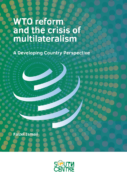Regional Comprehensive Economic Partnership (RCEP)
Investment Policy Options for Facing COVID-19 Related ISDS Claims
By Daniel Uribe and Danish
Developing and least developed countries have undertaken a number of measures to fight against the multidimensional impacts of the COVID-19 pandemic. Such measures and those that may be adopted in the context of the recovery efforts are, however, susceptible to challenges by foreign investors using investor-State dispute settlement mechanisms.
This policy brief first considers the kinds of measures States have adopted to limit the spread of COVID-19, protect their strategic sectors and promote economic recovery, including through foreign investment aftercare and retention. It then addresses how the investor-State dispute settlement system (ISDS) has been used by investors in times of crises, based on the analysis of the awards in several cases brought against both developed and developing countries.
Against this backdrop, the brief elaborates on the different options and initiatives States can take for preventing ISDS claims at the national, bilateral, regional and multilateral levels. It concludes with some policy advice for developing and least developed countries to face possible COVID-19 related ISDS claims in the future.
(more…)
TRIPS Flexibilities and TRIPS-plus Provisions in the RCEP Chapter on Intellectual Property: How Much Policy Space is Retained?
By Vitor Henrique Pinto Ido
The Regional Comprehensive Economic Partnership (RCEP) was signed on 15 November 2020 by 15 Asian-Pacific countries (ASEAN—Brunei Darussalam, Cambodia, Indonesia, Laos, Malaysia, Myanmar, Philippines, Singapore, Thailand, and Vietnam—, and China, Japan, South Korea, Australia and New Zealand), comprising about one third of the world’s population and economy. India was a crucial party to the negotiations but opted out of the agreement. Ratification of the agreement is still pending, subject to more Parties ratifying it at the national level. This paper provides a broad overview of the RCEP agreement and discusses the details of the intellectual property (IP) Chapter. Significantly, it does not contain substantive TRIPS-plus provisions that undermine public health in developing countries—although it does contain such provisions in other areas such as copyrights, trademarks, and IP enforcement.
(more…)
WTO reform and the crisis of multilateralism – A Developing Country Perspective
 About the Book:
About the Book:
The WTO has not been able to recover since the collapse of the Doha Round in July 2008. Several ministerial conferences including the Buenos Aires meeting in December 2017 failed to reach agreement. The US Trump Administration launched a campaign to reform the WTO in 2018 and 2019. This book argues that the Trump Administration reform proposals have been much more aggressive and far-reaching than the Obama Administration before it, threatening to erode hard-won special and differential treatment rights of developing countries. By blocking the appointment of new Appellate Body members, the US has effectively paralysed the Appellate Body and deepened the crisis of the multilateral trading system. Developing countries have responded to the proposals and called for the WTO to be development-oriented and inclusive. This book provides a critical analysis of the US-led reform proposals and seeks to build a discourse around an alternative set of concepts or principles to guide the multilateral trading system based on fairness, solidarity, social justice, inclusiveness and sustainability.
Author: Faizel Ismail served as the Ambassador Permanent Representative of South Africa to the WTO (2010-2014).
(more…)













 About the Book:
About the Book: